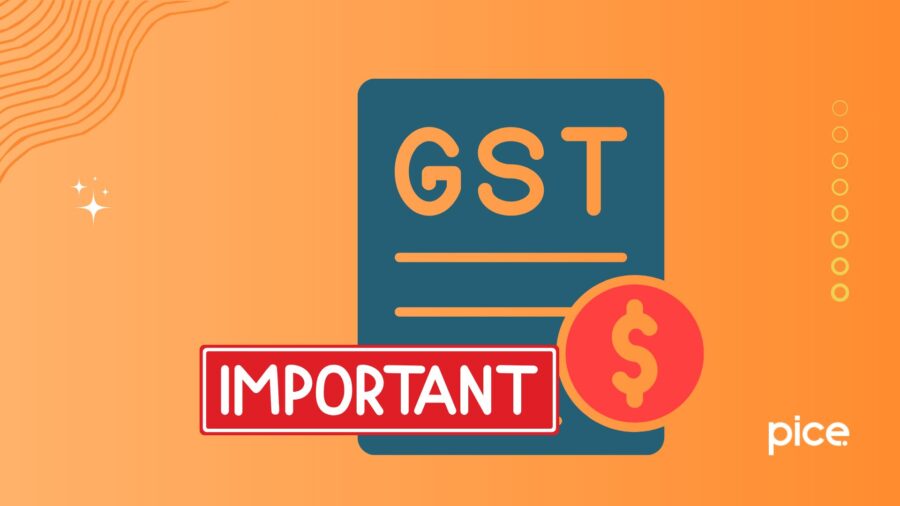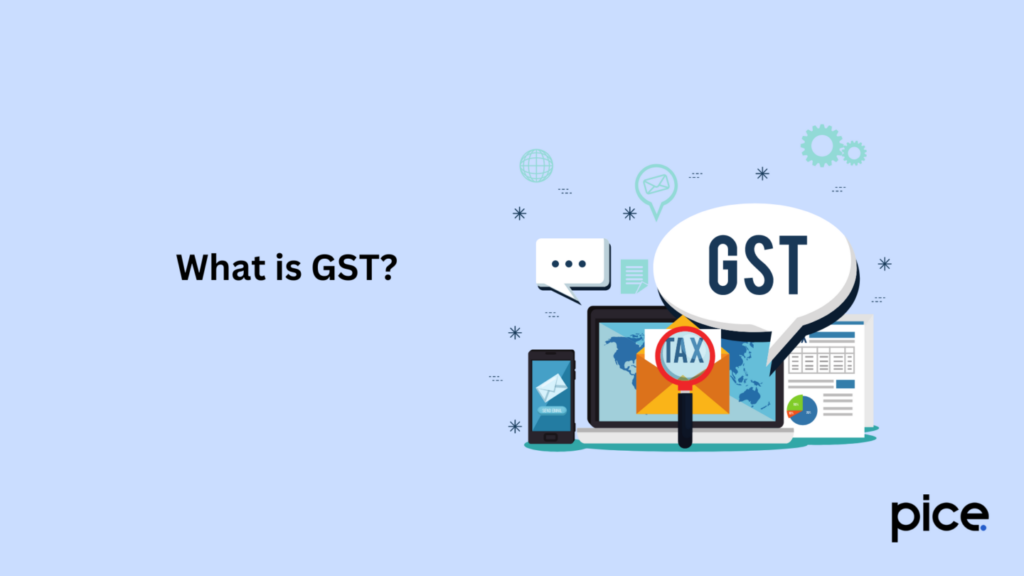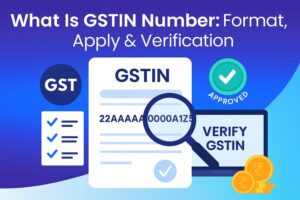Why GST Number is Important? Meaning, Structure and Format
- 9 Jul 25
- 10 mins

Why GST Number is Important? Meaning, Structure and Format
Key Takeaways
- The GST Number (GSTIN) is a unique 15-digit identifier that ensures tax compliance and legal recognition for businesses under the GST regime.
- Obtaining a GSTIN simplifies interstate trade, reduces tax cascading, and unlocks benefits like the Input Tax Credit (ITC).
- Businesses with annual turnover above ₹40 lakhs (₹20 lakhs for special category states) are mandatorily required to register under GST.
- A structured GSTIN includes state code, PAN, and registration sequence, aiding transparency and tax tracking.
- While GST registration offers many advantages, it also introduces compliance duties like record maintenance, timely filings, and audit preparedness.
The Goods and Services Tax (GST) has revolutionised the indirect tax system in India by replacing a multitude of cascading taxes with a unified tax structure. One of the fundamental aspects of the GST regime is the GST Number, also known as GSTIN or GST Identification Number. This unique identifier is assigned to every business registered under GST and serves as its identity in the tax system.
Whether you're a business owner, a supplier, or a consumer, understanding the GST Number is essential for compliance, transparency, and proper invoicing. This article provides an in-depth look at GST Numbers, their structure, importance, and practical examples.
In this guide, you can learn about why the GST number is important. Throughout the blog, we have addressed many common doubts of people who are new to the entire system under the GST regime.
What is GST?

GST or Goods and Services Tax is a form of indirect tax that is imposed by the Indian Government on the supply of goods and services. It is a multi-layered, destination-based taxation framework that is applied at every value-addition stage.
Since its inception, the GST has replaced many indirect taxes like excise duty, VAT, service taxes, and so on. Instead, now the sellers charge GST at each point of sale all across India.
Historical Background of GST
Many wonder if the idea of GST is new, but in reality, it isn’t. The core concept was brought to the public in 1954 in France, where the Government named it ‘Taxe sur la Valeur Ajoutée’ or VAT. After this, many different countries sought inspiration from this plan and implemented their own versions of GST.
Similarly, India joined the list of countries adopting GST-like taxation on July 1, 2017, and it significantly helped to simplify the taxation rules.
Why Was GST Implemented?
Before understanding why the GST number is important, it is essential to first consider the fundamental reason for its creation.
The primary motive behind the implementation of GST was to eradicate the cascading effect of taxes. Many readers can directly relate to this situation where taxes previously piled up, thus suffocating taxpayers with heavy burdens. This situation was not comfortable for both the Indian citizens and the Government.
Therefore, the Indian Government decided to introduce the GST, which would foster a more efficient, transparent, and unified tax system, simultaneously boosting businesses and purchase potential.
Purpose and Importance of a GST Number
To develop an idea about why the GST number is important, read the pointers below:
- Having a GSTIN Makes it Easier to Start a Business
Registered businesses can scale throughout the country without worrying about the various tax rules in different states. Additionally, centralised taxation has eliminated high registration fees that one had to pay earlier.
- GSTIN Boosts Efficiency in Logistics
Earlier, when multiple taxation guidelines were in effect, supplies needed thorough checks while crossing different state borders. Now, the reduced number of checks has directly contributed to operational efficiency.
- Sellers Can Avail the Composition Scheme
Under the composition scheme, the government allows several rebates to businesses that have an aggregate turnover rate not exceeding ₹1.5 Crores in a year.
Moreover, all the different types of taxes that existed before like the service tax, additional customs duty, Central Excise Duty, etc. have now been clubbed. This has allowed business operators to spend less time calculating their tax liabilities and simultaneously experience a hassle-free profit-generating process.
How to Obtain a GST Number?

Before preparing to get registered under the GST system, you must be aware of the eligibility criteria. As per the latest regulations, firms that have an annual turnover of more than ₹40 Lakhs can apply for a regular GST registration. This minimum threshold has been set to ₹20 Lakhs in some special category states.
Application Process for Obtaining a GST Number
You can follow the instructions provided below to obtain a GSTIN:
Step 1: Visit the official GST portal and click on ‘New Registration’ under ‘Services’.
Step 2: Next, you must complete Part A of the application form or Form GST REG-01. Once done, you will receive a Temporary Reference Number or TRN.
Step 3: Now, you have to sign in to the GST portal again using your TRN. After this, fill up Part B of the application. You will need to upload a set of documents at this stage.
Step 4: After completing the necessary actions, kindly review your details. Finally, you can submit the form and receive an Application Reference Number (ARN) through SMS and email.
When all the details are verified, the GST authorities typically process your application within 2 to 6 working days.
Documents Required for GST Registration
The following documents are needed to get registered under the GST:
- Aadhaar card
- PAN card of the applicant
- Address proof of the place of business
- Incorporation certificate or business registration proof
- ID and address proof of all the promoters, along with their recent photos
- Bank account statement or cancelled cheque
- Letter of Authorisation or Board Resolution for Authorised Signatory
- Digital signature of the applicant
The Structure of a GST Number
Let us decode the individual components of a sample GST number 03AAAPA1234A1Z5. Here 03 means Punjab (state code) while AAAPA1234A corresponds to the PAN of the business. Next, the digit 1 clarifies that it is the first registration of the business’ Permanent Account Number in Punjab. Whereas, Z is a reserved character while 5 is the checksum digit for error detection.
This systematic demarcation of a GSTIN helps simplify the taxation procedures. It assists the authorities in quickly verifying and regulating GST-related activities in any part of the nation.
Benefits for Businesses With a GST Number
Here are some reasons why businesses should consider getting a unique GSTIN:
- Increased Credibility
Acquiring GST registration shows that a business is running legally, and it naturally instils trust in the customers.
- Access to Input Tax Credit
A GST number enables business owners to claim an Input Tax Credit or ITC. It means that one can recover the tax they had earlier paid while purchasing supplies to be used in business.
- Ability to Expand Your Customer Base
Most large enterprises only deal with GST-registered suppliers. Therefore, by completing successful GST registration, you can explore a whole new customer base, which will present lucrative business opportunities.
Limitations and Constraints of a GST Number

So far, while understanding why the GST number is important, you have realised its numerous benefits. However, there are certain limitations, too:
- Additional Administrative Burden
When the business comes under GST, you must comply with several record-keeping guidelines. It directly correlates to more paperwork and a little bit of additional effort to make the most out of tax advantages.
- Impact on Pricing
If you levy GST on your sellable goods and services then the price will increase for your customers. It may have an impact on your business’ standpoint in relation to the market. This can become a major issue if your competitors are not registered under the GST.
- Threshold Limitations
Some businesses that might have benefited from Input Tax Credit (ITC) and other provisions under the Goods and Services Tax (GST) may not be required to register under GST if their annual turnover does not exceed the minimum threshold.
Responsibilities and Compliance for GST Registered Businesses
All GST-registered businesses must ensure:
- Properly Collecting and Remitting GST
It is the duty of the business operator to levy the right amount of GST on each sale and submit the collected amount to the government. Failing to abide by this rule can cause exemplary penalties and fines.
- Maintaining Accurate Records
Recording invoices of the sales, GST collected and tax paid is crucial for tax audits. The tax authorities will review them during thorough audits.
- Filing GST Returns
The management or accounts department must regularly file tax returns, typically monthly, quarterly or sometimes annually, based on the nature of the business.
Compliance Requirements for GST Registered Businesses
Some compliance factors that businesses must consider before getting registered under the GST regime are given below:
- Timely and Accurate GST Return Filings
Filing accurate information about tax collection and sales on time is non-negotiable under GST. When businesses fail to do so, the authorities impose interest charges on the pending amount and sometimes unpleasant consequences follow.
- Regular Payment of GST Liability
Besides filing timely returns, businesses should also pay their GST liability within a stipulated time frame.
- Cooperation During Audits
When the tax authorities decide to visit your establishment for an audit, you should be well-prepared with all the financials on point.
To ensure a seamless GST journey, you must understand and meet all your responsibilities and compliance obligations.
Conclusion
Understanding why the GST number is important is just the beginning for entrepreneurs. Once they realise its importance, they usually aim to acquire a GSTIN, as it serves as a unique identifier for tax purposes. Furthermore, it assists businesspersons who are involved in interstate trades.
Therefore, it is essential to have a comprehensive knowledge of GST before starting a business in India. Being well-versed with your GST obligations helps build trust and sets the foundation for a more professional and credible business presence.
💡If you want to streamline your invoices and make payments via credit or debit card or UPI, consider using the PICE App. Explore the PICE App today and take your business to new heights.
FAQs
What is a GST Number (GSTIN) and why is it important?
Who needs to register for a GST Number in India?
How is a GST Number structured?
The first two digits represent the state code.
The next ten characters are the PAN of the business.
The 13th digit is the registration number under the same PAN.
The 14th is a default letter (usually Z) and the 15th is a checksum digit for verification. This structure helps in standardised identification and error detection.
What documents are required to obtain a GST Number?
PAN and Aadhaar of the applicant
Business address proof
Business registration certificate or incorporation proof
Bank details (statement or cancelled cheque)
Photographs and ID/address proof of promoters
Authorisation letter and digital signature for validation. These ensure authenticity of the business and individuals involved.
What are the responsibilities of a GST-registered business?
Collect and remit GST accurately on sales
Maintain records of transactions, invoices, and taxes
File GST returns monthly, quarterly, or annually
Pay GST dues on time
Cooperate during audits and stay updated with compliance guidelines. Failing to do so may lead to penalties, interest charges, or suspension of GST registration.
 By
By 
















